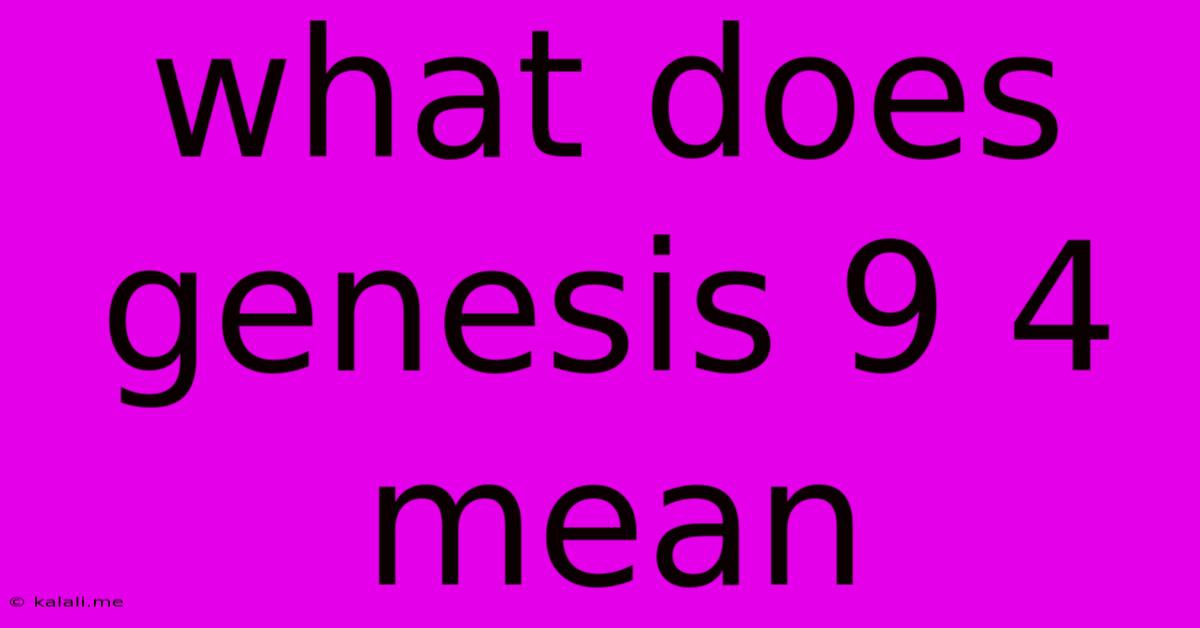What Does Genesis 9 4 Mean
Kalali
May 23, 2025 · 3 min read

Table of Contents
What Does Genesis 9:4 Mean? Understanding the Biblical Prohibition Against Blood
Genesis 9:4 is a pivotal verse in the Old Testament, outlining a crucial dietary restriction given by God to Noah and his descendants after the great flood. It reads: "But you must not eat meat that has its lifeblood still in it." Understanding this verse requires examining its historical context, its implications for dietary laws, and its ongoing theological significance. This article will delve into the meaning of Genesis 9:4, exploring its nuances and interpretations.
The Context of Genesis 9:4
Following the flood, God establishes a new covenant with Noah, promising never again to destroy the earth with a flood (Genesis 9:8-17). This covenant is accompanied by specific stipulations, one of which is the prohibition against consuming meat with its blood still in it. This restriction isn't merely a dietary regulation; it's deeply intertwined with the sanctity of life and God's dominion over creation. The verse comes immediately after God grants humans dominion over animals, but with the clear condition of respecting the sanctity of life.
The Significance of Blood
In the biblical narrative, blood consistently holds profound symbolic meaning. It represents life itself (Leviticus 17:11, Deuteronomy 12:23). The prohibition against consuming blood therefore underscores the reverence due to life, created in God's image. This resonates with the broader theme of respecting creation and acknowledging God's sovereignty over all living things. The draining of blood before consumption serves as a visual acknowledgment of this respect.
Interpretations and Applications
Several interpretations of Genesis 9:4 exist:
-
Literal Interpretation: This view emphasizes a strict adherence to the literal meaning of the text, prohibiting the consumption of any meat with its blood remaining. This has historically influenced various dietary laws and practices within Judaism and some strands of Christianity.
-
Symbolic Interpretation: This approach understands the prohibition as a broader symbol of respecting the sanctity of life and avoiding violence. The act of draining the blood becomes a ritualistic acknowledgement of life's inherent value.
-
Progressive Revelation: Some argue that the prohibition's application has evolved throughout biblical history. While the original intent might have been strictly literal, later interpretations might emphasize the underlying principles of respecting life and avoiding unnecessary cruelty.
The Connection to Later Dietary Laws
Genesis 9:4 lays the foundation for later, more detailed dietary laws found in Leviticus and Deuteronomy. These later laws elaborate on the prohibition against consuming blood, providing specific instructions on how to properly slaughter animals and drain their blood. These detailed regulations further emphasize the significance of respecting life and observing God's commands.
Conclusion: A Lasting Legacy
Genesis 9:4 isn't merely an archaic dietary restriction. Its enduring significance lies in its deeper message: respect for life, reverence for creation, and the acknowledgment of God's sovereignty. Whether interpreted literally or symbolically, the verse serves as a constant reminder of our responsibility to treat all living beings with dignity and care. The implications of this verse continue to resonate in ethical considerations surrounding animal welfare and our relationship with the natural world. The verse challenges us to consider the impact of our actions on the environment and the creatures that share it with us.
Latest Posts
Latest Posts
-
Can You Join In Musaf Shabbat
May 23, 2025
-
How To Get Urine Smell Out Of Carpet Dog
May 23, 2025
-
What Do You Call Your Cousins Child
May 23, 2025
-
Lyrics To Audioslave I Am The Highway
May 23, 2025
-
Why Are Deserts Often Found Near Mountain Ranges
May 23, 2025
Related Post
Thank you for visiting our website which covers about What Does Genesis 9 4 Mean . We hope the information provided has been useful to you. Feel free to contact us if you have any questions or need further assistance. See you next time and don't miss to bookmark.